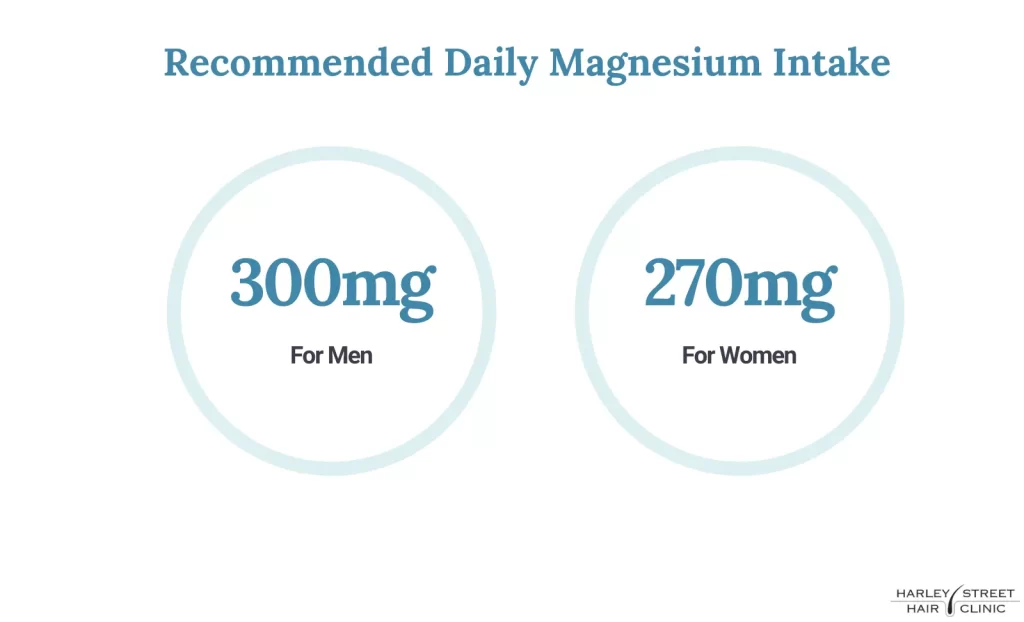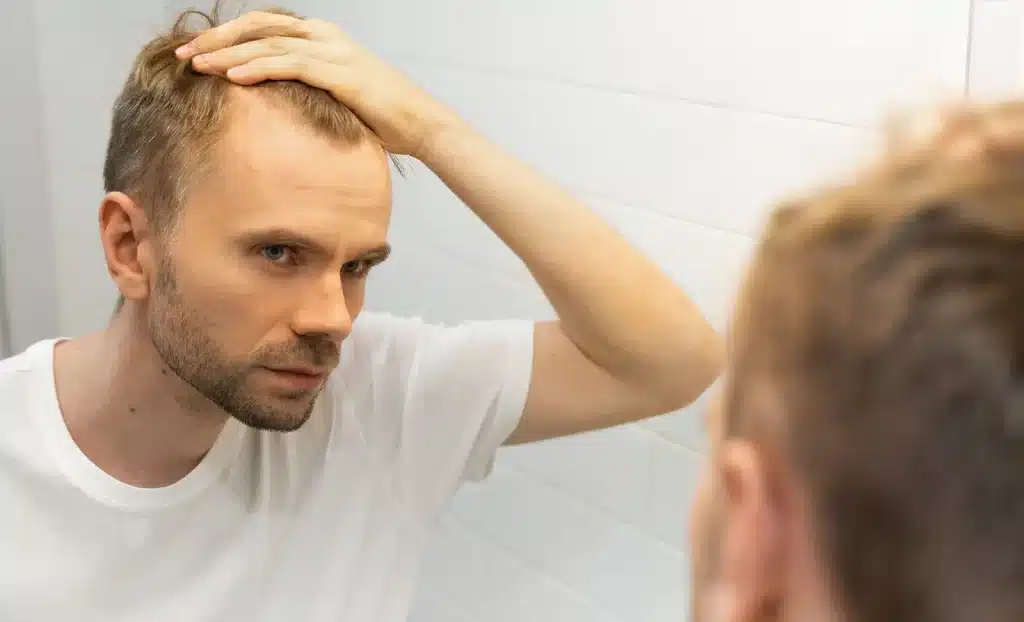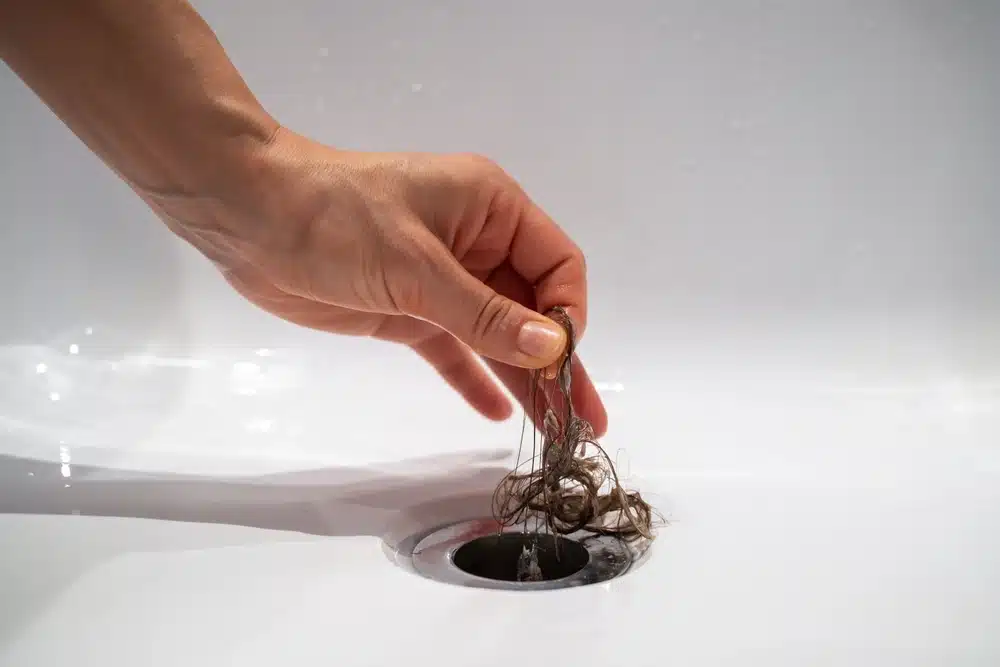Magnesium is an essential mineral every human needs to support normal bodily functions, and it can even help maintain healthy hair. While magnesium does not directly contribute to hair loss, a magnesium deficiency can contribute to hair shedding. To avoid this, you can either take magnesium supplements or adjust your diet to include magnesium-rich foods.
- What is Magnesium? Magnesium is an essential mineral found in many types of foods. It’s a crucial part of anyone’s diet as it supports many regular bodily functions, including blood sugar management, blood pressure control, and muscle function.
- How Does Magnesium Affect the Hair? Magnesium regulates calcium, which means it prevents calcium build-up on the scalp. It also supports healthier hair structure and health by improving blood flow to the scalp and reducing inflammation. The stress-relieving properties of magnesium can also help with stress-induced hair loss.
- Who is at Risk of a Magnesium Deficiency? People with type 2 diabetes, alcoholism, kidney issues, IBS (irritable bowel syndrome), and celiac disease are at a higher risk of a magnesium deficiency. It’s also more common in older people.
- What Foods are Rich in Magnesium?: Seafood, legumes, leafy greens, nuts, seeds, chicken, beef, and tofu.
- What Are the Signs of a Magnesium Deficiency? Common signs of a magnesium deficiency are muscle problems (such as cramps or twitches), general fatigue, low appetite, feelings of numbness, and tingling sensations.
- How Do You Treat a Magnesium Deficiency? You treat a magnesium deficiency by first understanding the cause. From there, treatment involves diet adjustments or oral supplements (in many cases, both).
Hair loss can occur for various reasons, and sometimes it’s hard to pinpoint exactly what’s triggering it. Could it be a magnesium deficiency, and if so, could taking magnesium supplements help prevent hair loss?
Magnesium plays a vital role in your body’s functions, but that doesn’t necessarily mean it’s essential for full hair growth. Keep reading to learn more about magnesium’s role in preventing hair loss.
What is Magnesium?
Magnesium is an essential mineral that most people have plenty of in their bodies. It is present in many popular foods, including green leafy vegetables, beans, dark chocolate, and seeds. However, you can also find magnesium supplements to boost your intake. These are some of the most important functions magnesium contributes to:
- Regulation of Calcium
- Healthy Blood Sugar Levels
- A Supported Immune System
- Regulation of Heart Rhythm
- Increased Relaxation
- Energy Production
- Antioxidant Production
Is Magnesium Good for Hair Loss?
There is no denying that magnesium is a crucial mineral that helps the body function in various ways, but can it actually help with hair loss? Is taking magnesium for hair loss worth your time?
The truth is that magnesium does not directly impact hair loss. However, a magnesium deficiency may contribute to hair loss, and increasing your magnesium intake in this situation can boost hair growth.
Can Magnesium Deficiency Cause Hair Loss?
Yes, there is a link between magnesium deficiency and hair loss. The recommended amount of magnesium daily is 300mg for men and 270mg for women. [1] If your intake falls under this, there’s a chance of it affecting your hair, which is why.
It Reduces Inflammation: Inflammation of the scalp can contribute to hair loss. Magnesium has natural anti-inflammatory properties that lessen this, meaning taking the mineral can promote healthy growth.
It Boosts Blood Flow: Your hair follicles require good blood circulation to grow healthy hair. Magnesium promotes blood vessel relaxation (also known as vasodilation), which helps maintain healthy follicles.
It Facilitates Calcium Absorption: Calcium is another important nutrient that contributes to healthy hair growth, and magnesium facilitates its absorption, helping regulate your body’s calcium levels.
It Prevents Calcium Build Up: Calcium build-up on the scalp can get in the way of healthy hair growth, which is also known as calcification. Magnesium plays a role in regulating the body’s calcium, preventing this from happening.
It Helps Protein Synthesis: Another way magnesium can help with hair growth is by activating enzymes that help with protein synthesis, an essential process for healthy locks.
It Reduces Stress and Anxiety: Magnesium plays a role in managing your mood, specifically reducing stress and anxiety. This can be helpful for hair growth as too much stress can cause the hair to fall out, known as telogen effluvium. [2]
Potential Link Between Magnesium and DHT: DHT (dihydrotestosterone) is a hormone that often leads to androgenetic alopecia, especially in men. There has been some research into magnesium regulating the production of DHT and preventing hair loss.
So, as you can see, magnesium does play a role in maintaining healthy hair. Keep in mind that most people already get enough magnesium in their daily diets, as the mineral is so abundant in a variety of foods. However, magnesium deficiencies can occur, with hypomagnesaemia being the most severe and affecting up to 15% of the population. [3]
Who is More Likely to Be Deficient in Magnesium?
Most healthy adults will not have a magnesium deficiency – certain risk factors make this deficiency more likely:
- Type 2 Diabetes
- Alcoholism
- Kidney Problems
- Taking Certain Medications
- Crohn’s Disease
- Celiac Disease
- IBS (Inflammatory Bowel Disease)
- Polycystic Ovary Syndrome
- Old Age
If you fall under any of these risk factors and are concerned about a magnesium deficiency, speaking to your doctor is best.
The Signs of a Magnesium Deficiency
Are you worried that a magnesium deficiency is impacting your hair growth cycle? If so, these are the warning signs to watch out for:
- Muscle Cramps
- Low Appetite
- Nausea
- Abnormal Heart Rhythm
- Tremors
- Muscle Spasms
These symptoms do not 100% mean a magnesium deficiency; it’s always important to speak to a medical professional for an accurate diagnosis.
The Other Risks of a Magnesium Deficiency
A magnesium deficiency can lead to hair loss over time, but that’s not the only thing you should worry about. Here are some other issues caused by being deficient in this mineral:
- Heart Disease
- Osteoporosis
- Type 2 Diabetes
- Fatigue
- High Blood Pressure
- An Increased Risk of Stroke
A magnesium deficiency is not something to ignore; treating it sooner rather than later is important to reduce the risks.
Treating a Magnesium Deficiency
Do you need to take more magnesium for hair loss? If you have a magnesium deficiency, there are a few ways to treat it.
Taking Magnesium Supplements
The first option is to take magnesium supplements. You can buy these from many pharmacies and supermarkets for a low price, and it’s generally best to take them with a meal to maximise absorption and reduce the chances of gastrointestinal side effects. If you have a diagnosed magnesium deficiency, you can also get the supplements from your doctor, especially if you have other conditions caused by a magnesium deficiency, such as high blood pressure or osteoporosis.
Taking magnesium supplements is a straightforward, no-fuss way of getting all the magnesium you need – you just need to remember to take it every day.
Incorporating Magnesium Rich Foods into Your Diet
Another way to treat a magnesium deficiency is to eat magnesium-rich foods. The good news is that there are plenty of delicious foods that contain lots of magnesium, including:
- Spinach
- Almonds
- Dark Chocolate
- Beans
- Avocado
- Fish
- Chickpeas
- Tofu
So, no matter your dietary preferences, you are sure to be able to eat a magnesium-rich diet to prevent hair loss. Many foods also contain other essential vitamins and minerals for a healthy body and mind.
It may be worth using a hair track app while taking more magnesium for hair loss to see if a magnesium deficiency was actually the cause.
What If Your Hair Loss Is Not Caused by a Magnesium Deficiency?
While there is a link between magnesium and hair health, there’s a big chance that taking magnesium for hair loss does not work for you, especially if you do not have a magnesium deficiency.
Your main goal here is to figure out the root cause of your hair loss, as only then can you begin an action plan to boost your hair health. The most common cause of hair loss is androgenetic alopecia (male and female pattern baldness), which becomes more prevalent with age. Other potential causes include telogen effluvium, hormonal imbalance, certain medications, tight hairstyles, and scalp infections. The right hair loss treatment for you depends on what is causing the hair loss.
Looking Into Hair Loss Treatments
Promoting healthy hair growth means understanding the root cause of hair loss and finding the best treatment for your needs. The good news is that many effective treatments are available to help you regrow long and healthy tresses.
Hair Loss Medications: There are several hair loss medications available to treat hair loss, including minoxidil, finasteride, and dutasteride – minoxidil being the only one you can acquire over the counter. Minoxidil is also available to both men and women, and is often sold under the brand name Rogaine. Finasteride and dutasteride are for men only and require a prescription.
Non-Surgical Clinic Treatments: Some non-surgical clinical treatments have proven extremely effective at stimulating follicles and boosting hair growth, including PRP (platelet-rich plasma) injections and low-level laser therapy. These non-invasive treatments typically require a few sessions before you can see results.
Hair Transplants: The one surgical treatment for hair loss is a hair transplant. A hair transplant is a non-invasive surgery that takes healthy hair follicles from the back of the scalp (where they are strongest) and transplants them to the area with hair loss. While it’s a more costly method than others listed here, it’s very effective and the results last a lifetime, making it worth it to many.
Magnesium for Hair Loss: In Summary
Magnesium plays an important role in regulating blood pressure, calcium intake, and blood glucose. Getting enough magnesium in your diet is crucial for a healthy lifestyle and can help maintain healthy locks. If you think you have a magnesium deficiency, it’s important to check with your doctor and begin upping your magnesium intake, either by taking supplements or eating more magnesium-rich foods, to promote healthy hair growth and improve your health overall.
Is magnesium not the cause of your hair loss? Our hair loss experts can help. At our Harley Street Hair Clinic, we have already helped multiple patients regrow a full head of hair, and you could be next. Check out our patients gallery to see what our hair transplants can do!
Sources:
- https://www.nhs.uk/conditions/vitamins-and-minerals/others/#:~:text=The%20amount%20of%20magnesium%20you,women%20(19%20to%2064%20years)
- https://my.clevelandclinic.org/health/diseases/24486-telogen-effluvium
- https://metabolicsupportuk.org/condition/hypomagnesaemia/#:~:text=How%20common%20is%20it?,at%20high%20risk%20of%20hypomagnesemia.





